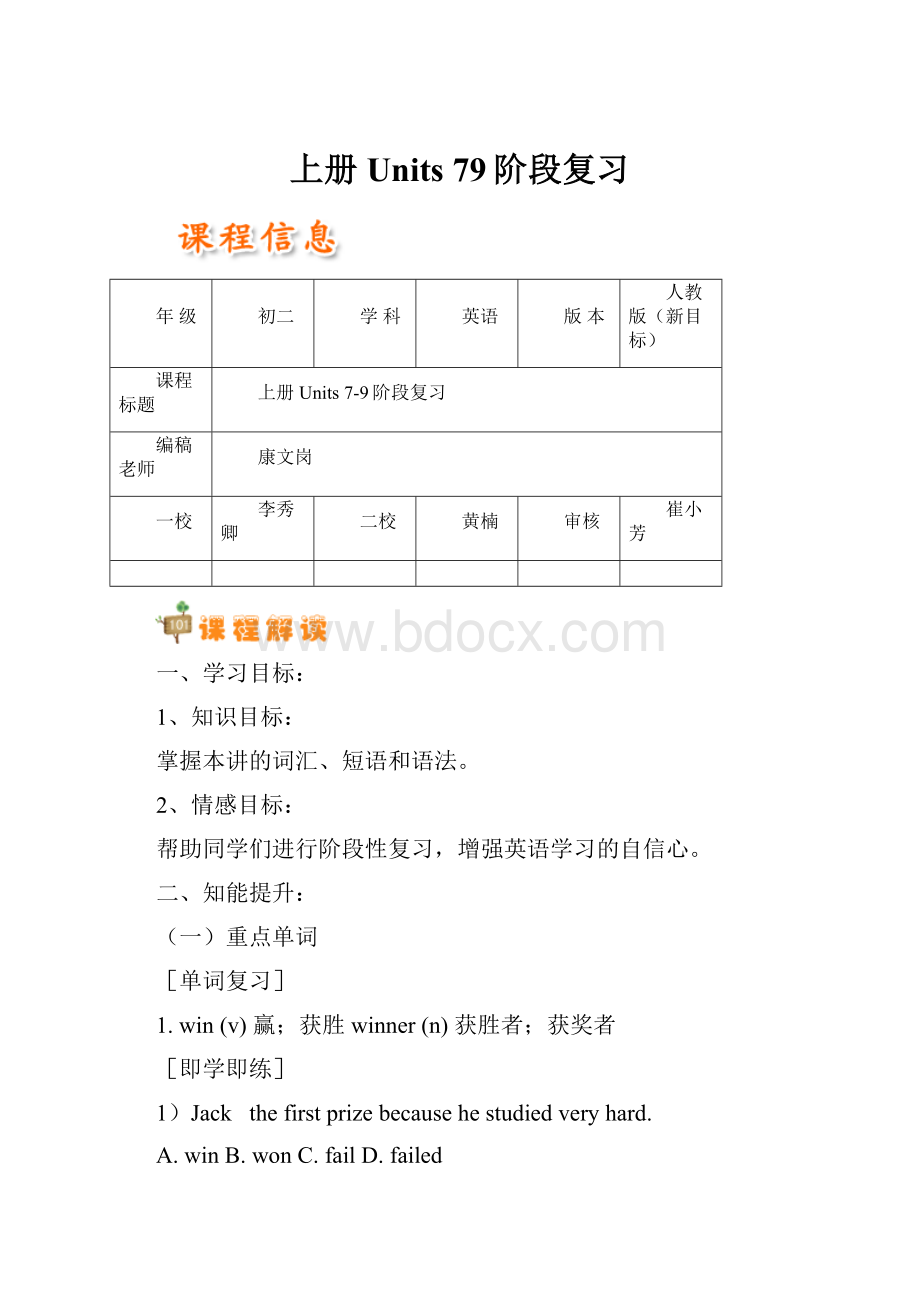上册Units 79阶段复习.docx
《上册Units 79阶段复习.docx》由会员分享,可在线阅读,更多相关《上册Units 79阶段复习.docx(17页珍藏版)》请在冰豆网上搜索。

上册Units79阶段复习
年级
初二
学科
英语
版本
人教版(新目标)
课程标题
上册Units7-9阶段复习
编稿老师
康文岗
一校
李秀卿
二校
黄楠
审核
崔小芳
一、学习目标:
1、知识目标:
掌握本讲的词汇、短语和语法。
2、情感目标:
帮助同学们进行阶段性复习,增强英语学习的自信心。
二、知能提升:
(一)重点单词
[单词复习]
1.win(v)赢;获胜winner(n)获胜者;获奖者
[即学即练]
1)Jackthefirstprizebecausehestudiedveryhard.
A.winB.wonC.failD.failed
2)Hewonthefirstprize.Hewasthe(win)
2.begin/start(v)开始
Theoldmenstartedsinging/tosing.老人们开始唱歌。
Westarteddoingourhomeworkat7o’clocklastnight.我们昨晚7点开始写作业。
[即学即练]
1)She(start)writingmusicwhenshewassevenyearsold.
2)Lilybegantheviolinattheageoffive.
A.learningB.learnsC.learnedD.learn
3.spend(v)度过;花费
Iusuallyspendmysummerholidayathome.我通常在家度过我的暑假。
Mycousinwillspendtheweekendwithus.我表弟要和我们一起度周末。
spend…onsth.在某物(事)上花费(时间,金钱)
Maryspentfiveyuanonthebook.玛丽买这本书花了五元钱。
Ioftenspendalotoftimeonmyhomeworkeverynight.
我经常每天晚上花大量时间做家庭作业。
spend…(in)doingsth.花(时间或金钱)做某事
Maryspentfiveyuan(in)buyingthebook.
Ioftenspendalotoftime(in)doingmyhomework.
[即学即练]
—WhataniceMP3!
Isityours?
—Ofcourse.I180yuanonit.
A.costB.tookC.spentD.paid
(二)重点短语
[短语复习]
1.turnon打开(水源、煤气、电源等),其反义短语为turnoff;
turndown(把收音机的音量、灯等)关小、调低,其反义短语为turnup。
这些短语中on,off,up,down都是副词,后接代词作宾语时,要放在它们的前面。
[即学即练]
1)Ican’tseeclearly,pleasethelight.
A.turnupB.turnoffC.turnonD.turndown
2)Canyoutheradio?
ItissonoisythatIcan’tlearn.
A.turnonB.turnoffC.turnbackD.turnover
2.mixup混合在一起
该短语也是由“动词+副词”构成的及物动词短语,是指把两种以上不同的东西混合起来。
当代词作宾语时放于中间。
[即学即练]
Puttheeggsandsugarinthebowlandtogether.
A.cutthemupB.cutupthemC.mixthemupD.mixupthem
3.howmany/howmuch
howmany意为“多少”,后接可数名词的复数形式,用来提问可数名词的数量。
howmuch也意为“多少”,用来提问不可数名词的数量,后接不可数名词;howmuch还可以用来提问价格。
[即学即练]
1)popcorndidyourmothermake?
A.HowB.WhatC.HowmanyD.Howmuch
2)HowmanyshallIcut?
A.breadB.sliceofbreadC.slicesofbreadD.breads
3)Thereisonlyonedeskintheclassroom.(对划线部分提问)
desksarethereintheclassroom?
4)Wecanseeasliceofbreadontheplate.(对划线部分提问)
breadyouseeontheplate?
4.attheendof
后接的名词可以表示时间,意思是“在……结束的时候”,也可以用来表示地点,意思是“在……的尽头”。
attheendofthestreet在街道的尽头;attheendofthisyear在今年年末
intheend=atlast=finally最后
Intheend,wewereverytired.最后,我们都很累了。
bytheendof只可接表示时间的名词,表示“到……末为止”,通常用于完成时态。
[即学即练]
1)MrBlack’svacationwasoveroflastmonth.
A.intheendB.attheendC.bytheendD.ontheend
2)在街道的尽头有一个书店。
thestreet,thereisabookstore.
5.havefundoingsth.做某事很开心
fun是不可数名词,同义词组有:
haveagoodtime,enjoyoneself
Theyhadfunsinginganddancinginthepartylastnight.
[即学即练]
Theyhadgreatinthewaterlastsummer.
A.funtoplayB.funplayingC.funnyplayingD.funnyplay
6.too…to…太……而不能
这是英语中常用的一种结构,其句型为“too+形容词或副词原级+todo…”,它在形式上是肯定的,但在意义上是否定的。
因此,不定式前一般不加not。
Sheistooyoungnottogotoschool.(×)
Sheistooyoungtogotoschool.(√)她太小了,还不能上学。
Thewateristoohottodrink.水太烫不能喝。
Theboyistooyoungtolookafterhimself.这个男孩太小了,还不能自己照顾自己。
该句型有时可与so…that…(如此……以至于……)结构转换:
Theboxistooheavyformetocarry.
→TheboxissoheavythatIcan’tcarryit.
[即学即练]
1)Thebagisveryheavy.Ican’tcarryit.(合并为一句)
Thebagisheavymecarry.
2)他太小了,还不能去上学。
Heisyoungtoschool.
3)Thismathproblemisdifficultforusworkout.
A.such;thatB.so;thatC.too;toD.very;to
7.takepartin/join
takepartin表示参加某项活动;join指参加某种组织
Didyoutakepartinthesportsmeeting?
你参加运动会了吗?
HejoinedthePartyattheageof40.他40岁时入了党。
[即学即练]
1)DengYaping(参加)theOlympicGamesin1994.
2)ChinatheWTOandbecameamemberofitseveralyearsago.
A.joinedB.joinC.willjoinD.tookpartin
8.attheageof在……岁时
Mikebegantowritestorybooksattheageof4.迈克四岁时就开始写故事书。
年龄的表达方法
(1)用基数词表达年龄,可以加上“…yearsold”例:
threeyearsold.
(2)用when引导的从句:
例:
whenIwasthree(yearsold).
(3)attheageof+基数词:
例:
attheageofthree
(4)基数词+-year-old例:
three-year-old,注意,这种表达常作定语,不可以作表语。
如:
athree-year-oldboy
[即学即练]
TigerWoodsstartedgolfingwhenhewasonlyold.
A.tenmonthsB.ten-monthsC.tenmonthD.ten-month
9.becauseof/because
becauseof表示因果关系时,其后只能接名词、代词或动名词。
because的语气较强烈,用来回答“why”开头的特殊疑问句,表示直接的、具体的和明确的原因。
一般放在主句之后。
[即学即练]
1)Shedidn’tgototheparktherain.
2)Hedidn’tcomewithme,hehadalotofthingstodo.
(三)重点语法
[语法复习]
一般过去时
概念及结构:
一般过去时的句式变化有两种:
一种谓语动词是be动词was或were;另一种谓语动词是实义动词(行为动词)。
1.谓语动词是be动词was或were的基本句式:
(1)肯定句:
主语+be+其他。
MrSmithwasinhisofficeattenthismorning.
Wewereyoungatthattime.
(2)否定句:
在was,were后直接加not,可缩略为wasn’t,weren’t。
Hewasn’tathomeyesterday.
(3)一般疑问句:
把was,were提到主语之前需大写。
Wewereyoungatthattime.→Wereyouyoungatthattime?
(4)肯定回答:
Yes,wewere.否定回答:
No,weweren’t.
2.谓语动词是实义动词的基本句式:
(1)肯定句:
主语+实义动词的过去式+其他。
Iwenttothecinemalastweek.
(2)否定句:
主语+助动词didn’t+动词原形+其他。
Ididn’tgotothecinemalastweek.
(3)一般疑问句:
助动词Did+主语+动词原形+其他?
Didyougotothecinemalastweek?
(4)肯定回答:
Yes,Idid.否定回答:
No,Ididn’t.
【考题链接】
①—DidTinagotothezoo?
—.Butshewenttotheaquarium.
A.No,shedid.B.Yes,shedidn’t.C.No,shedidn’tD.Yes,shedid.
答案:
C
解题思路:
一般疑问句的回答前后要一致,排除A、B选项,由Butshewenttotheaquarium可判断她没去动物园,所以用否定回答。
②IplayedtenniswithTomyesterday.(改为否定句)
ItenniswithTomyesterday.
答案:
didn’tplay
解题思路:
此题考查句式结构。
一般过去时的否定形式为:
“主语+was/were+not+其他”或“主语+didn’t+动词原形+其他”。
3.动词过去式的构成。
一般过去时中动词的过去式有规则变化和不规则变化两种。
(1)规则变化一般在词尾加ed,具体变化如下:
构成规则
原形
过去式
在动词原形末尾直接加ed
look,
work
looked
worked
结尾是不发音e的动词加d
live
hope
lived
hoped
末尾只有一个辅音字母的重读闭音节的动词,先双写这个辅音字母,再加ed
stop
plan
stopped
planned
以“辅音字母+y”结尾的动词,先把y变为i再加ed
study
worry
studied
worried
(2)不规则动词的过去式,需要单独记忆。
4.一般过去时的用法。
(1)表示在过去某个时间发生的动作或存在的状态。
时间状语有:
yesterday,lastweek,justnow,anhourago,in2008等。
Helosthiswatchlastweek.
Therewasnosupermarketinthesmalltownsixyearsago.
(2)表示过去习惯性、经常性的动作或行为。
Ioftenwenttoschoolbybus,butnowIgoinmyfather’scar.
WhenEdisonwasachild,heoftenaskedsomestrangequestions.
【考题链接】
①—Whenyourmotheryouthatbluedress,Mary?
—Sorry,Ireallycan’tremember.
A.does;buyB.has;boughtC.had;boughtD.did;buy
答案:
D
解题思路:
此题考查时态。
句意为“玛丽,你妈妈什么时候给你买的那条蓝裙子?
”根据句意可知动作已经发生,所以用一般过去时。
②Healwaysalotoftroublewhenhewasachild.
A.causeB.causedC.causesD.causing
答案:
B
解题思路:
此题中虽有always这个频度副词,但由于有whenhewasachild.这个明显表示过去的时间状语从句,所以整个句子应该用一般过去时。
[即学即练]
1.I(go)toseemyunclelastSunday,buthe(notbe)athome.
2.—Whenyou(buy)thebike?
—LastMonday.
3.He(put)somemoneyinhisbagandwentaway.
4.—Didyougooutlastnight?
—Yes,I(go)tothecinema.
5.Itwasraininghard.Unfortunatelyweumbrellaswithus.
A.takeB.tookC.didn’ttakeD.don’ttake
6.—Jack,where’smysmallroundmirror?
—Sorry,Betty.Iit.
A.breakB.brokeC.willbreakD.ambreaking
上册Unit10I’mgoingtobeabasketballplayer.
一、预习新知
重点单词:
grow,over,practice,build
重点短语:
communicatewith,getaletterfromsb.,atthesametime,ayearortwo
重点句型:
1.I’mgoingtomovesomewhereinteresting.
2.Somegirlsaregoingtoexercisemoretokeepfit.
重点语法:
begoingto结构
二、预习点拨
思考问题一:
grow有哪些意思?
思考问题二:
begoingto的基本用法有什么?
思考问题三:
试举一些不定式作目的状语的例子。
(答题时间:
45分钟)
Ⅰ.单项选择
1.Howapplesandhowyogurtdoyouneed?
A.many;muchB.much;manyC.many;manyD.much;much
2.Ineed.
A.twobreadB.twoslicesbreadC.twosliceofbreadD.twoslicesofbread
3.─Whatdoyouthinkofthemusic,Fred?
─Itwonderful.
A.smellsB.looksC.tastesD.sounds
4.─anyvisitorsattheaquarium?
─Yes,therewere.
A.IsthereB.ArethereC.WasthereD.Werethere
5.─Didyouthefamousactor?
─Yes.Ihimyesterday.
A.meet;metB.meet;meetC.met;metD.met;meet
6.Hisbrotherallhisfreetimetheviolin.
A.spends;playingB.spent;playsC.takes;playD.paid;for
7.mynext,Iwanttovisitmygrandparents.
A.On;offB.On;dayoffC.When;dayoffD.When;off
﹡8.Myfatherstartedattheagesixteen.
A.tosmoke;atB.smoked;ofC.smoking;inD.smoking;of
9.HermotheranEnglishteacherwhenshewastwenty-fiveold.
A.becomes;yearB.became;yearsC.became;year’sD.become;years’
﹡10.HisgrandfatherbornAugust12th,1913.
A.is;onB.is;inC.was;inD.was;on
﹡11.IhopeBeijingnextSunday.
A.visitB.tovisitingC.tovisitD.visiting
12.WewenttoHainanIslandonNationalDayandhadgreatfuninthesea.
A.surfB.surfsC.surfingD.tosurf
﹡13.Thechildrenarelaughing.Theylook.
A.happily;happyB.happily;happilyC.happy;happilyD.happy;happy
14.It’stimeforustolistentothenews.Wouldyoupleaseturntheradio?
A.onB.offC.downD.out
﹡15.Thelightofthisroomwasdim(昏暗的)forTomreadatnight.
A.too;toB.enough;toC.too;nottoD.so;that
﹡Ⅱ.完形填空
OnceaFrenchman1inEngland.Heonlyknew2English.Onedaywhenhewassittingbythewindowofarestaurantandwashavinglunch,he3avoice“Lookout!
”Soheputhishead4ofthewindowtofindoutwhatwas5outside.Justthenabasinofdirtywaterpouredoverhishead.Hewas6.Heshouted,“Damnyou!
See7youhavedone.”
Othermenlaughed8himandhegotevenmoreangry.Oneofthemsaidtohim,“You9aforeigner,‘Lookout’inEnglishmeans‘Be10’”!
1.A.gotB.reachedC.arrivedD.went
2.A.littleB.alittleC.fewD.afew
3.A.listenedB.sawC.lookedD.heard
4.A.outB.